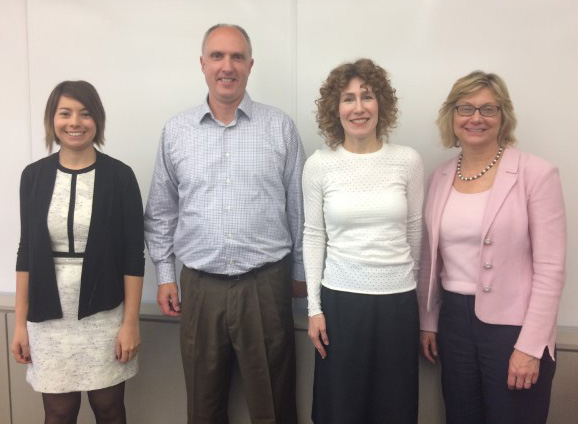CaRDI roundtable addresses ‘dire’ rural health challenges
By Daniel Aloi

The need to foster healthier rural communities informed discussion at a recent research roundtable, “Enhancing Community Impacts of School-Based Health Clinics in Rural New York.”
Hosted by the Community and Regional Development Institute (CaRDI), the roundtable explored interventions, including parent education, that Cornell research and outreach could assist with, beginning with two rural counties.
The motivation for the project, CaRDI co-faculty director and associate professor John Sipple said, was an email he received in 2014 from a Bassett Healthcare Network pediatrician, noting “profound poverty” as an obstacle to school-based clinical services having much impact on rural children.
Under the direction of Dr. Chris Kjolhede, Bassett operates 21 rural school-based clinics in central New York, out of more than 250 state-mandated clinics (most are in urban areas) providing medical treatment, immunizations, dental care and mental health services to schoolchildren. While the clinics “do a very good job” treating individual children, “they have very little impact on the broader communities in which these children live,” Sipple explained. “We’re trying to have a community-level impact.”
Sipple said he also was approached by a downstate school superintendent asking for heroin use data “‘because it is killing our community,’” and showed a series of demographic maps charting population change and the escalating proportion of heroin and opiate-related admissions to healthcare facilities across the state from 2007 to 2014.
“The work in the rural communities presents a whole set of challenges. There’s high incidence of drug use and abuse, parental abuse and neglect, teen pregnancy, a lot of poverty,” said Kim Kopko, director of the Parenting in Context project and associate director of Cornell Cooperative Extension and of extension and outreach in the College of Human Ecology (CHE).
With campus and community partners, CaRDI is working on a grant proposal to the Robert Wood Johnson Foundation for work to enhance and create a culture of health in Otsego and Chenango counties, where Bassett has several rural school clinics.
Site visits to rural schools
On two Chenango County site visits, “in beautiful schools in very rural areas, the clinics themselves are impressive. That’s the good news,” Kopko said. “But the story that we heard from the staff … the dental hygienist said she gave a 6-year-old a toothbrush and he said, ‘What is this?’ Another student asked if he could keep his toothbrush at school because ‘we have one in the house and everybody uses it.’”
By the time children in rural districts start school, many of them “already have dental issues or obesity or they are undernourished,” said Maria Jose Sanchez Arrieta, a Cornell Institute for Public Affairs (CIPA) project associate.
“You can provide children with lunch at school, but then what happens on the weekend, when you arrive home when you don’t have food, or heating? Sometimes they don’t have water,” she said. “I am used to working in developing countries, and it was really shocking to face almost the same issues here, an hour and a half from Cornell.”
Arrieta also said transportation for nonemergency medical services is reimbursable through Medicaid, a federal program, but complicated at the local level for rural residents.
Jillian Kasow, director of the state Legislative Commission on Rural Resources, cited a bill passed by the state Senate that expands access to telehealth services, including remote patient monitoring. “In rural areas it’s very difficult to get patients to their doctor’s appointments [for] preventive care,” Kasow said.
She said federal policy in the early 2000s had supported the idea that “transportation is essential to overall community health,” but in the wake of state budget cuts, “we’re seeing some counties that are struggling to maintain funding for their transportation systems.”
Schools as community hubs
Reaching families with the school as a hub could help build community health and capacity, said CIPA director Sharon Tennyson, professor of policy analysis and management.
“We’re trying to pull together various programs and resources to make it attractive and feasible for the families,” she said, including a community garden project in CHE. “These areas are apparently food deserts, [with a] need for community gardens, nutrition education and increasing availability of nutritious foods.”
Kopko said she is awaiting word on a grant proposal to bring portable parent education into the schools from extension offices, with research on community impacts to inform implementing the portable model elsewhere.
“We may be more readily providing access to parents, but will there be uptake? If you build it, will they come? We don’t know; we’re hopeful, but it’s a start,” Kopko said. “Where the conditions are this dire, you need to start somewhere. We’re starting where we know the needs are the greatest, and we’re going to learn from that and hope that we can make some change.”
Media Contact
Get Cornell news delivered right to your inbox.
Subscribe